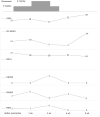Possible effect of blonanserin on gambling disorder: A clinical study protocol and a case report
- PMID: 33889612
- PMCID: PMC8040182
- DOI: 10.12998/wjcc.v9.i11.2469
Possible effect of blonanserin on gambling disorder: A clinical study protocol and a case report
Abstract
Background: Gambling disorder is characterized by excessive and recurrent gambling and can have serious negative social consequences. Although several psychotherapeutic and pharmacological approaches have been used to treat gambling disorder, new treatment strategies are needed. Growing evidence suggests that dopamine D3 receptor plays a specific role in the brain reward system.
Aim: To investigate if blonanserin, a dopamine D3 receptor antagonist, would be effective in reducing gambling impulses in patients with gambling disorder.
Methods: We developed a study protocol to measure the efficacy and safety of blonanserin as a potential drug for gambling disorder, in which up to 12 mg/d of blonanserin was prescribed for 8 wk.
Results: A 37-year-old female patient with gambling disorder, intellectual disability, and other physical diseases participated in the pilot study. The case showed improvement of gambling symptoms without any psychotherapy. However, blonanserin was discontinued owing to excessive saliva production.
Conclusion: This case suggests that blonanserin is potentially an effective treatment for patients with gambling disorder who resist standard therapies, but it also carries a risk of adverse effects. Further studies are needed to confirm the findings.
Keywords: Blonanserin; Case report; Clinical trial protocol; D3 receptor; Gambling disorder; Medication.
©The Author(s) 2021. Published by Baishideng Publishing Group Inc. All rights reserved.
Conflict of interest statement
Conflict-of-interest statement: This study was supported by a grant from the Council for Addiction Behavior Studies, a non-profit organization in Japan. The last author received research funds and a lecture fee from Dainippon Sumitomo Pharma. We have no other conflicts of interest to declare.
Figures

References
-
- Mishra S, Lalumière ML, Morgan M, Williams RJ. An examination of the relationship between gambling and antisocial behavior. J Gambl Stud. 2011;27:409–426. - PubMed
-
- Sproston K, Erens B, Orford J. Gambling Behaviour in Britain: Results from the British Gambling Prevalence Survey. Report for the National Centre for Social Research, London, UK, 2000.
-
- Łabuzek K, Beil S, Beil-Gawełczyk J, Gabryel B, Franik G, Okopień B. The latest achievements in the pharmacotherapy of gambling disorder. Pharmacol Rep. 2014;66:811–820. - PubMed
-
- Ahlskog JE. Pathological behaviors provoked by dopamine agonist therapy of Parkinson's disease. Physiol Behav. 2011;104:168–172. - PubMed
Publication types
LinkOut - more resources
Full Text Sources
Other Literature Sources

